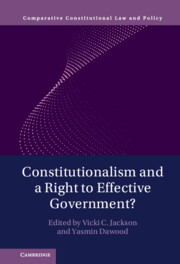Book contents
- Constitutionalism and a Right to Effective Government?
- Comparative Constitutional Law and Policy
- Constitutionalism and a Right to Effective Government?
- Copyright page
- Dedication
- Contents
- Tables
- Contributors
- Acknowledgments
- Part I Introduction
- Part II What Are Constitutions For?
- Part III Positive Rights and Rights to Effective Self-Government
- Part IV The Role of Courts in Building State Capacity and Promoting Effective Self-Government While Protecting Rights
- 9 The Unconstitutional State of Affairs Doctrine
- 10 Courts and Effective Governance
- 11 The New Managerialism
- Part V Executive and Administrative Constitutionalism in Effective Democratic Government
- Part VI Legislatures, Representation, and Duties of Effective Self-Government
- Part VII Politics, Sociology, Media, and Corruption as Contexts for Constitutionalism and Governance
- Index
11 - The New Managerialism
Courts, Positive Duties, and Economic and Social Rights
from Part IV - The Role of Courts in Building State Capacity and Promoting Effective Self-Government While Protecting Rights
Published online by Cambridge University Press: 20 October 2022
- Constitutionalism and a Right to Effective Government?
- Comparative Constitutional Law and Policy
- Constitutionalism and a Right to Effective Government?
- Copyright page
- Dedication
- Contents
- Tables
- Contributors
- Acknowledgments
- Part I Introduction
- Part II What Are Constitutions For?
- Part III Positive Rights and Rights to Effective Self-Government
- Part IV The Role of Courts in Building State Capacity and Promoting Effective Self-Government While Protecting Rights
- 9 The Unconstitutional State of Affairs Doctrine
- 10 Courts and Effective Governance
- 11 The New Managerialism
- Part V Executive and Administrative Constitutionalism in Effective Democratic Government
- Part VI Legislatures, Representation, and Duties of Effective Self-Government
- Part VII Politics, Sociology, Media, and Corruption as Contexts for Constitutionalism and Governance
- Index
Summary
The constitutional entrenchment of economic and social rights often requires courts to intervene directly in the administration of government. Such rights – to access goods, services, and programs such as social security, education, and health care – are now present in more than two-thirds of the world’s constitutions.1 Newer constitutional amendments extend such rights to housing, land, water, and a clean environment, implicating a wide array of government actions or omissions. Moreover, despite the conventional wisdom that such rights should not be enforced by courts, and should be entrenched at most as directive principles or other statements of aspiration, the duties for government that such rights create are increasingly justiciable.2 For better or worse, courts have become central in enforcing both negative and positive duties, in complaints arising from such matters as medical treatment denials, evictions, education outcomes, pollution levels, or food distribution schemes.
Keywords
- Type
- Chapter
- Information
- Constitutionalism and a Right to Effective Government? , pp. 135 - 150Publisher: Cambridge University PressPrint publication year: 2022



